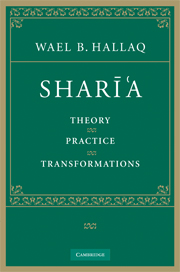Book contents
- Frontmatter
- Contents
- Preface and acknowledgments
- Introduction
- Part I The pre-modern tradition
- Part II The law: an outline
- Part III The sweep of modernity
- 13 The conceptual framework: an introduction
- 14 The jural colonization of India and South-East Asia
- 15 Hegemonic modernity: the Middle East and North Africa during the nineteenth and early twentieth centuries
- 16 Modernizing the law in the age of nation-states
- 17 In search of a legal methodology
- 18 Repercussions: concluding notes
- Appendix A Contents of substantive legal works
- Appendix B Chronology
- Bibliography
- Index
16 - Modernizing the law in the age of nation-states
Published online by Cambridge University Press: 05 June 2012
- Frontmatter
- Contents
- Preface and acknowledgments
- Introduction
- Part I The pre-modern tradition
- Part II The law: an outline
- Part III The sweep of modernity
- 13 The conceptual framework: an introduction
- 14 The jural colonization of India and South-East Asia
- 15 Hegemonic modernity: the Middle East and North Africa during the nineteenth and early twentieth centuries
- 16 Modernizing the law in the age of nation-states
- 17 In search of a legal methodology
- 18 Repercussions: concluding notes
- Appendix A Contents of substantive legal works
- Appendix B Chronology
- Bibliography
- Index
Summary
Introduction
It should by now be clear that, between the early years of the nineteenth century and the second decade of the twentieth, the Sharīʿa – which had dominated the legal scene for over a millennium in the central lands of Islam, and for centuries in other regions – was largely reduced in scope of application to the area of personal status, including child custody, inheritance, gifts and, to some extent, waqf. In the Malay States and the Indonesian Archipelago, its sphere was even narrower, partly due to the adat which had long prevailed in some of these domains, and partly due to the metamorphosis of some Sharīʿa laws into English law (as happened in the law of waqf). The present chapter follows the fortunes (indeed misfortunes) of Islamic law in the subsequent period, roughly from the end of the Second World War until the dawn of the twenty-first century.
It goes without saying that it is impossible here to provide an account of every new code and statute promulgated in Muslim countries, much less to offer a meaningful analysis of their details. I shall instead describe and analyze trends, movements and themes that can be identified as having played central roles in twentieth-century legal history, and the way they anticipated or paved the grounds for the emerging Muslim will to (re-)instate what is perceived to be Islamic law.
- Type
- Chapter
- Information
- Sharī'aTheory, Practice, Transformations, pp. 443 - 499Publisher: Cambridge University PressPrint publication year: 2009
- 5
- Cited by



